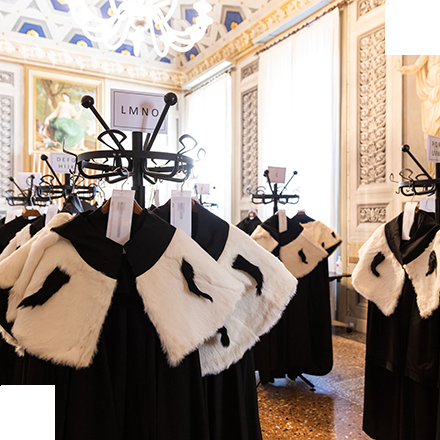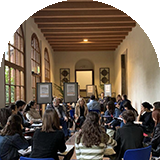Università Cattolica del Sacro Cuore Largo A. Gemelli, 1 - 20123 Milan
Elena Miroglio
With a degree in Economics from Università Cattolica, she is vice-president of the family textile company
It was the last decades of the 1800s when Carlo Miroglio and his wife Angela began selling fabrics on a cart in the villages of the Langhe. Their son Giuseppe founded the company in 1947 in Alba that still bears his surname today: 49 companies in 34 countries, 5500 employees and 622 million euros in turnover (2016 data) from brands such as Motivi or Elena Mirò.
Four generations later, the company's vice president and president of the Fashion division is Elena Miroglio, born in 1970, with a degree in Economics from Università Cattolica.
Dr. Miroglio, what memories do you have of your years of study at Università Cattolica?
Even though many years have passed, I remember that the University of Largo Gemelli was a protected place, a historic environment where you could breathe culture. All this exerted a certain fascination on me, that of the past and that of study, which I then breathed every time I happened to go back. Università Cattolica also has a serious, reassuring image, and has been for me an environment of professional formation and, above all, of human growth. Moreover, it can be said that Cattolica is, so to speak, a family passion: in fact, my twin sister Elisa had joined me and then it was the turn of my brother Giuseppe, who is now the president of the Miroglio Group.
Is there any professor you have a particular memory of?
I remember with pleasure Professor Enzo Pontarollo, who taught Industrial Economics. He was the supervisor of my degree thesis and it was he who pushed me to do a particular job, which talked about the figure of the entrepreneur abroad with interviews in the field. He impressed me a lot because he asked for a paper that was absolutely not connected with my family's company and that had both theoretical and practical parts. Every now and then we still talk to him, I gladly go to his lessons to talk to the boys.
After graduating, he studied for a year in the United States, earning a Business and Management Certificate from the University of Santa Barbara, California. How much has this experience affected your career?
The months in the United States were the most beautiful experience of my life: getting to know different cultures is a very enriching experience, even today I encourage International Programs at all levels. My father was elderly and wanted his children to join the family business, so my sister and I decided to spend a year in California to perfect our English and do an internship in an American company, starting to gain experience with our own legs. They were beautiful, intense and decisive months.
Have you noticed any differences between American and Italian business cultures?
In the United States we were very attached to production processes and less to creative ones, fashion was not so much the result of instinct as the result of the application of precise techniques. In California I found objectivity in every business function, less instinct and more analysis, whereas here everything was more empirical. Experiencing first-hand the reality of an American company was very important because it brought me into contact with the Anglo-Saxon culture: even then Americans were an example, they worked less than us and still managed to be more effective.
Where does your passion for fashion come from?
It's something I've been used to since I was a child; Since ours is a family business , I never asked myself too many questions. Being the heir to three generations of entrepreneurs undoubtedly generates a sense of belonging, but also the responsibility of being part of the future of this brand.
What consequences has the economic crisis had in the field of fashion?
The last few years have forced us to change models on an epochal scale, especially in the clothing sector. The most obvious result was the clear division between luxury and low-cost products, putting the wide middle range of consumers in difficulty. In addition, digital has cut out all kinds of intermediaries: Amazon and e-commerce make the product much more available and accessible to everyone, but they condition our habits and create very high expectations for companies and brands.
We want to give buyers an added value, different from the price. The point, however, is that production costs are rising, while prices cannot do the same. Clothing is becoming almost a commodity and it is essential to seek distinctiveness and specialization.
You have gained experience in the United States, but the Elena Mirò brand is absent from the American market. How come?
There is too much local competition in the field of clothing. With import duties and competition from both China and local companies at the moment, it is not cost-effective for us. And the sizes should also be reviewed.
For the time being, our priorities are in other countries. In the future, also seeing how the market evolves, we will reconsider the United States.
Other companies of excellence, such as Ferrero, were also born in the Langhe. Is it a coincidence?
We don't know, but certainly our area is an interesting case study. We are not a district, because generally districts often develop around a single company, on the wave of its success and in its own sector. Here, on the other hand, there are many winning business models to look at: there is us in the clothing sector, there is Ferrero in the food sector, but there are also many other companies in services, mechanics, agricultural and wine companies of excellence. What we have in common is the sharing of strong values such as reliability, concreteness and attention to a sustainable result, which all come from this land, of which I am particularly proud.
You were created a Knight of the Republic in 2007 by President Napolitano...
I remember when they told me I thought it was a joke, I was very surprised. It was an important recognition, a stimulus to move forward on our path. What fills me most with pride, however, is the motivation: to have promoted an alternative standard of beauty, which would go beyond the stereotype of simple thinness.
We want to encourage women to value their diversity, to take care of their appearance but without fixating on a specific stereotyped canon of beauty. There is no specific height and size. Moreover, this honor has a special flavor because it was given to me on March 8th, Women's Day.
What advice would you give to those who want to enrol at Cattolica today?
It may seem trivial, but my advice is to identify your passion and follow it to the end. Don't just follow the trends of the moment but start from your own talent. Enrolling in trendy faculties without thinking too much about it was already in vogue when I went to university, marketing and communication courses had a boom in enrolments compared to previous years. I also suggest gaining international experience as soon as possible, even if only for three months with seasonal initiatives, not because the destiny is necessarily to work abroad, but to immerse yourself in diversity, get to know many opinions and many markets. Broaden your horizons.
Finally, learn a trade. Desiring a career with growth in roles and economics is positive and to achieve it in the best possible way I recommend not only taking an interest in the managerial aspects of a profession but to experience first-hand how it is done concretely.
Presence, July - October 2018 by Stefano Francescato






